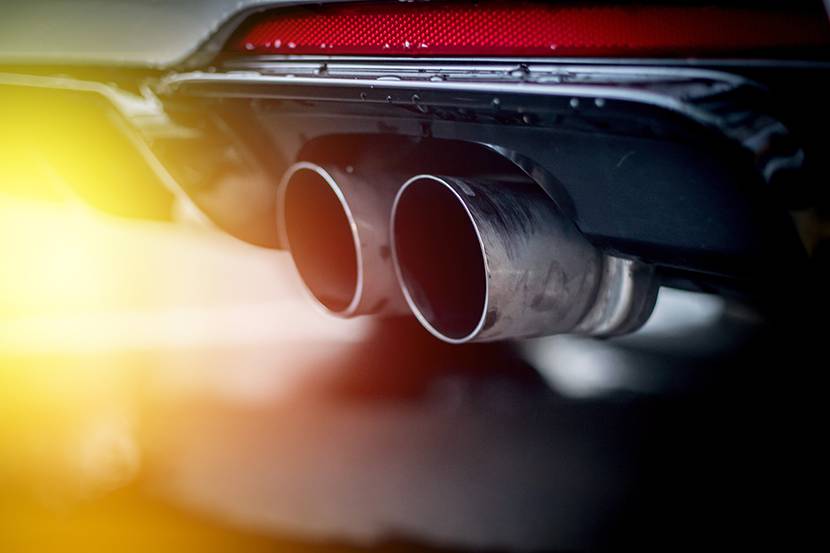The government is going to take strict action on noisy drivers. It announced this in its ‘Plan for Drivers’in October this year.
At the moment, a few councils in the UK use acoustic cameras to catch drivers whose cars make noise above a certain decibel level.
But this new announcement means councils have the power to penalise drivers who are responsible for growing levels of noise pollution. These drivers could face fines if they’re caught by the planned network of acoustic cameras.
This might come as a relief to over a third* of motorists who told us that noisy drivers and loud exhausts were one of the most annoying driving habits.
We explain how the noise cameras technology works and what might happen to your car insurance if you’ve got a loud exhaust. We'll also tell you what you can do if noisy cars are bothering you.

What is a noise camera?
Noise cameras, or acoustic cameras, are equipped with audio sensors that are triggered by cars and other vehicles that exceed pre-defined noise limits. These cameras are backed by £300,000 worth of government funding.
They also use automated number plate recognition (ANPR) technology, which can read licence plates to help identify lawbreakers.
ANPR is already used in the likes of speed cameras and congestion charging zones.
In 2022, some local councils installed acoustic-camera technology in 4 locations around the UK to see if it could capture noisy vehicles on camera.&
One noise camera in Westminster caught a car reaching 111.1 decibels. This is the equivalent to a steel mill or a rock concert.
In 2021, Kensington and Chelsea council in West London introduced the devices. They issued what are thought to be the UK’s first camera-enabled fines for excessively loud vehicles.
Before the trials in the UK, similar noise camera schemes were tested in the United Arab Emirates as well as in Edmonton, Canada.
Why is the government introducing noise cameras?
When the UK scheme was originally unveiled in 2019, officials said noise-camera technology was necessary to eradicate the nuisance of cars and motorbikes revving their engines. This problem was particularly felt in rural and residential areas.
The new cameras can also help police gather evidence on noisy drivers. Police have the power to issue fines on noisy cars with or without the cameras. But it’s difficult to gather evidence because most reports are from witnesses. The new cameras can help capture noisy drivers and issue a fine.
Noisy vehicles can also have an impact on people’s health. When announcing its scheme, the DfT referred to studies that showed exposure to noise pollution can play a major role in health issues ranging from:
- Heart attacks
- High blood pressure
- Stress
- Type-2 diabetes
Former Transport Secretary Grant Shapps said:
“For too long, rowdy drivers have been able to get away with disturbing our communities with illegal noisy vehicles. It’s time we clamp down on this nuisance, banish the boy racer and restore peace and quiet to local streets.”
What happens if a driver has a loud car exhaust in the UK?
Under existing noise pollution laws, motorists with an exhaust that generates 'excessive' noise could get an on-the-spot fine of £50.
The police can also demand that the offending vehicle is taken off the road until they reduce the noise to a more acceptable level.
Do noise cameras work?
In late 2020, the London borough of Kensington and Chelsea launched its own noise-camera pilot scheme after being unable to join the original DfT programme.
Officials said this followed 35 official complaints of excessive noise relating to engines revving between June and August 2020.
Councillors said that, in particular, Chelsea’s Sloane Street was a “magnet for Lamborghinis and Ferraris”, with drivers using the road to cruise and rev their engines.
Kensington and Chelsea had previously introduced a Public Space Protection Order. This gave its officers the right to issue penalty notices for excessive vehicle noise.
Between June 2021 and February 2022, almost 10,000 vehicles triggered the camera. The camera could also identify that BMWs were breaking the sound threshold the most.
Fines range from £100 to £2,500, and the council has the powers to seize the vehicles of persistent offenders.
The success of the pilot means that the scheme has since been extended to other parts of the borough.
What is the exhaust noise limit?
In Britain, the legal limit for noise made by an exhaust is 74 decibels – roughly as loud as a flushing toilet.
Before the cameras, police officers had to use their own judgement to decide whether cars were breaking the noise limit.
During the trial, the government didn’t set a pre-arranged level that triggered the noise camera.
But those used in the London scheme were calibrated to catch offenders who generated 80 decibels or more. This is about as loud as an alarm clock.
This is a similar approach to speed cameras that have some tolerance before they’re triggered.
How can I report a loud car exhaust?
If you’re being bothered by noisy car exhausts, your best options are to call 101 or make a complaint to your local council.
Alternatively, if it’s a neighbour’s loud car that is causing the nuisance, you might want to try and resolve the neighbour dispute amicably yourself.
Does having a loud exhaust impact on car insurance?
Drivers who modify their cars by adding powerful new exhausts could pay more for their car insurance. In fact, for drivers between 21 and 25, the average premium for a car with 2 modifications is £1,312.80*. That's as well as running the risk of being caught by new noise cameras.
But in some cases the consequences could be even more drastic. Owners who make major modifications without telling their car insurance provider could find their car insurance policy is void:
“The government announcement to penalise drivers for noisy cars should be good news for motorists and residents.
“For those motorists with exhausts that exceed the noise limits, you could look into getting a quieter exhaust, or getting a mechanic to tone it down. Otherwise you could face a fine of £50.
“The new announcement should make drivers think twice before modifying their exhaust. But be aware that if you are thinking of adding modifications to a car it could lead to higher car insurance costs. This is because they’re potentially more attractive to thieves as well as more expensive to repair. “Most motor insurance policies require you to inform your insurer as soon as possible if you're making significant modifications to your car. So it’s a good idea to speak to your insurer before authorising this kind of work. “That way, you should know whether or not you have to pay a higher price for your policy. And you should have the peace of mind of knowing that you’re still insured.”What our motor insurance expert says:

*Confused.com data October 2022 - October 2023.
How loud are electric cars compared to petrol and diesel cars?
Loud exhausts are a problem, but could a car that's too quiet car be dangerous?
Electric cars don't create as much noise as a car with a combustion engine, in fact they barely create any noise at all.
But they're so quiet that pedestrians might not know they're there. This could put pedestrians at risk when they're crossing the road.
People who are visually impaired may also be at risk if they can't hear EVs approaching.
New regulations say that EVS now have to make an artificial sound of at least 40 decibels (about as loud as a fridge humming) so that they can be heard by pedestrians.
Some car manufacturers have used this as an excuse to get creative. BMW hired Hans Zimmer to compose the sounds for its Vision M Next.
The good news is this isn't enough of a noise to be a nuisance. So hopefully EVs continue to improve the quality of our environment by reducing noise and emissions.
*Research carried out by One Poll on behalf of Confused.com of 2,000 UK drivers who have car insurance policies. This was conducted between 3 and 7 July 2023.


